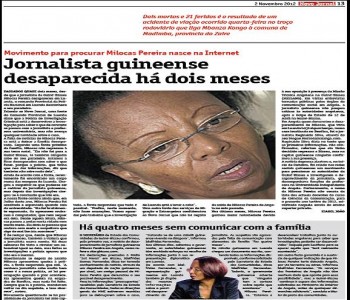Where is Milocas Pereira? [1] A question echoing through the blogosphere for a couple of weeks, but the response is slow in coming. On social networks a movement sprung up to pressure Guinean authorities to investigate the disappearance, six months ago, of the journalist and university professor in the Angolan capital city Luanda, where she has lived since 2004. On Facebook the group “SOS, STOP! – Queremos a Jornalista Milocas de volta [2]” (We Want Journalist Milocas Back) [pt] already has 5,775 members.
Recently [3], the President of the Association of Community of Guinea-Bissau Immigrants in the United States, Celina Spencer, also launched a petition [4] directed to the UN High Commission of Human Rights, to try and get support to locate the journalist.
She offered some interviews, analyzing some of the crises currently occurring within Guinea-Bissau. Specifically, the Guinean government's role and presence of the Angolan military “Missang” deployed to Guinea-Bissau for military reformation [on which Global Voices reported [5] upon the coup d'etat in April 2012]. It is unknown whether her disappearance is connected with the interviews or not. It is certain however, she was assaulted by strangers. Afterwards, feeling threatened in Luanda, she considered and confided to a friend that she desired to return back home.
In an interview with Angolan television, at the beginning of January, the professor spoke about the situation in Guinea-Bissau after the death of President Malam Bacai Sanhá [6]. After this, Milocas Pereira said that she began to feel under great pressure [7] [pt].
On last November 3, the Sindicato dos Jornalistas Angolanos [7] (Union of Angolan Journalists) [pt] denounced that the Guinean journalist had been “terrorized” in Luanda:
Milocas Pereira foi agredida no início do mês de Maio por desconhecidos antes de ter comunicado a algumas pessoas com quem falou a sua intenção de deixar Angola, na sequência desta agressão, que foi apontada pela própria como sendo a causa mais próxima da sua decisão.
Milocas Pereira was attacked in the beginning of the month of May by unknown people, before having communicated her intention to leave Angola to some people she had spoken with. She pointed to this attack as the cause for this decision.
According to “Sol Mansi” Radio [8] [pt], the journalist had no doubts that the attack had strong political motivations:
Ela estava a correr risco de vida, pelo que a única solução que tinha era abandonar imediatamente Angola, para regressar ao seu país. Aconselhada pela sua amiga a denunciar publicamente a agressão, MP disse que preferia não o fazer. Aconselhada ainda a ir para Portugal, MP disse que não confiava nos portugueses e que se sentia melhor na Guiné-Bissau com os responsáveis de transição.
She was running the risk of losing her life, and the only solution that she had was to immediately leave Angola, and return to her country. Counselled by a friend to publicly denounce the attack, MP said she preferred not to. Further counselled to go to Portugal, MP said she did not trust the Portuguese and said she would feel better in Guinea-Bissau with those responsible for the transition.
Last October, in statements to the same radio station, the Secretary of State for Communities in Guinea-Bissau, Idelfrides Gomes Fernandes confirmed the news [9] [pt] about the possible disappearance of the journalist for the first time. Four months after her mysterious disappearance, the family decided to contact authorities, but the only response that they got was silence [4].

In its November 2nd edition, the Novo Jornal (New Newspaper) (Angola) dedicated an entire page to the disappearance of the journalist.
Two months ago, Bartolomeu Capita of the National Movement of Cabinda wrote on the site of the organization Peace & collaborative development network [10] that Milocas Pereira could have been ordered killed in Angola:
Nobody has seen Ms. Pereira or simply heard from her for almost a month now. Yet she was teaching at the independent University of Angola. Concerns have arisen which must be addressed. More and more fellow scholars are discreetly suggesting that she may have been murdered, for having sought to investigate certain matters related to the obscure links between Angola's criminal regime and Guinea-Bissau.
News of the disappearance [11] [pt] of the 58 year old journalist was made public at a time in which the family – that was trying not to complicate police investigations – began to lose hope that Milocas was still alive. The brother of the professor, Carlos Pereira, who lives in Lisbon, said to Voice of America [12] [pt]:
O que nos chega [de Luanda] é isso, está desaparecida desde finais de Julho. Suspeitamos de muita coisa. Que ela tivesse dado com muita coisa e tivesse necessidade de fugir, de esconder ou que tenha havido alguma retaliação.
What comes to us [from Luanda] is this, she has disappeared since the end of July. We suspect a lot. That she could have run into many things and needed to flee, hide or had some could of retaliation.
On the blog Rispito [13] [pt], the Guinean Samba Bari alleges that the disappearance is another challenge for the transitional authorities and that the situation could widen the fissure between the Guinean government not recognized by Luanda and the Angolan government.